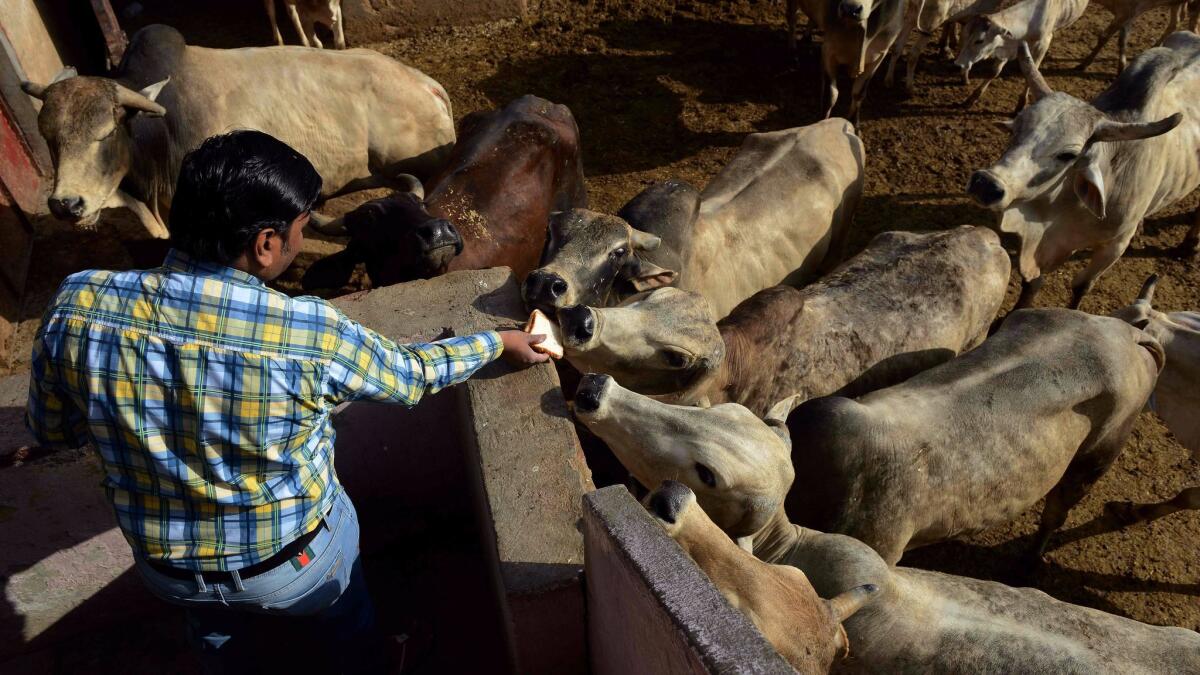India bans sale of cows for slaughter, a move designed to appease conservative Hindus

- Share via
Reporting from Mumbai, India — The Indian government has issued a nationwide ban on selling cattle for slaughter, the toughest measure yet imposed to protect cows, an animal that conservative Hindus regard as sacred.
Under new rules issued this week, the government ordered that no cows or buffaloes could be traded at a livestock market without a signed declaration by the owner that the animal was not being sold for slaughter.
Anyone buying livestock would have to present a document showing that he or she is an “agriculturalist.”
The rules came as part of a tough new law against animal cruelty, but commentators said they were aimed at placating hard-line Hindu supporters of Prime Minister Narendra Modi’s nationalist government.
Hindus form an overwhelming majority among India’s 1.3 billion people, and many of them eschew beef out of respect for the bovine.
But beef, which is cheaper in India than many other sources of protein, is a major part of the diet of Muslims, Christians and Hindus from the lowest rung of the ancient caste system, known as Dalits, or “untouchables.”
The leader of the southern state of Kerala, which has a large Christian population, criticized the move as “fascist” and a “clear attack on our plurality.”
Pinarayi Vijayan, the state’s chief minister, tweeted that the law would rob hundreds of thousands of people of jobs, cripple the leather industry and affect the diets of millions of people.
The rules build on legislation passed in several states, most led by Modi’s Bharatiya Janata Party, to ban the slaughter of cattle. The laws have stoked violence by Hindu vigilante groups that have attacked Muslims and others on suspicion of smuggling cattle or possessing beef.
India’s environment minister, Harsh Vardhan, said the new rules applied only to sales at livestock markets and that cattle bought and sold directly from farms would not be affected.
“The aim of the rules is only to regulate the animal market and sale of cattle in them and ensure [the] welfare of cattle” in the markets, Vardhan said, according to the Press Trust of India.
But the meat trade in India, a $4-billion industry, is centered on animal markets and dominated by Muslims and Dalits, who would be most affected by the change.
In the western state of Maharashtra, where a government led by Modi’s party banned the slaughter of cows in 2015, thousands of butchers have lost their jobs and many meat shops have closed.
In the city of Aurangabad, Mohammad Qureshi, 31 — part of a Muslim community that has traditionally slaughtered cattle and sold the meat for export — said his family’s beef business has dwindled. The business has survived because the state ban did not include buffalo meat, but now buffalo cannot be sold at markets for slaughter either.
“What are we supposed to do?” Qureshi said. “I have a family to look after and this shop is all I have. By imposing these rules, the government is making lives difficult for minorities.”
The nationwide rules would also prevent farmers from selling aging and unproductive cattle to be slaughtered, which many farmers have typically done to raise money and avoid the expense of maintaining an unproductive animal.
Many observers criticized the government for imposing new layers of bureaucracy and paperwork on cattle traders, many of whom are poor and uneducated.
Anyone seeking to sell cattle at a market would need to furnish identification documents — both for himself and the animal — creating what one commentator called “a cow bureaucracy in the 21st century.”
Follow @SBengali on Twitter for more news from South Asia
Parth M.N. is a special correspondent.
ALSO
Violent protests erupt in Kashmir after Indian forces kill 8 suspected militants
International court orders Pakistan to halt execution of alleged Indian spy
In a victory for animal rights activists — and dogs — China will ban dog meat sales at festival
More to Read
Sign up for Essential California
The most important California stories and recommendations in your inbox every morning.
You may occasionally receive promotional content from the Los Angeles Times.











